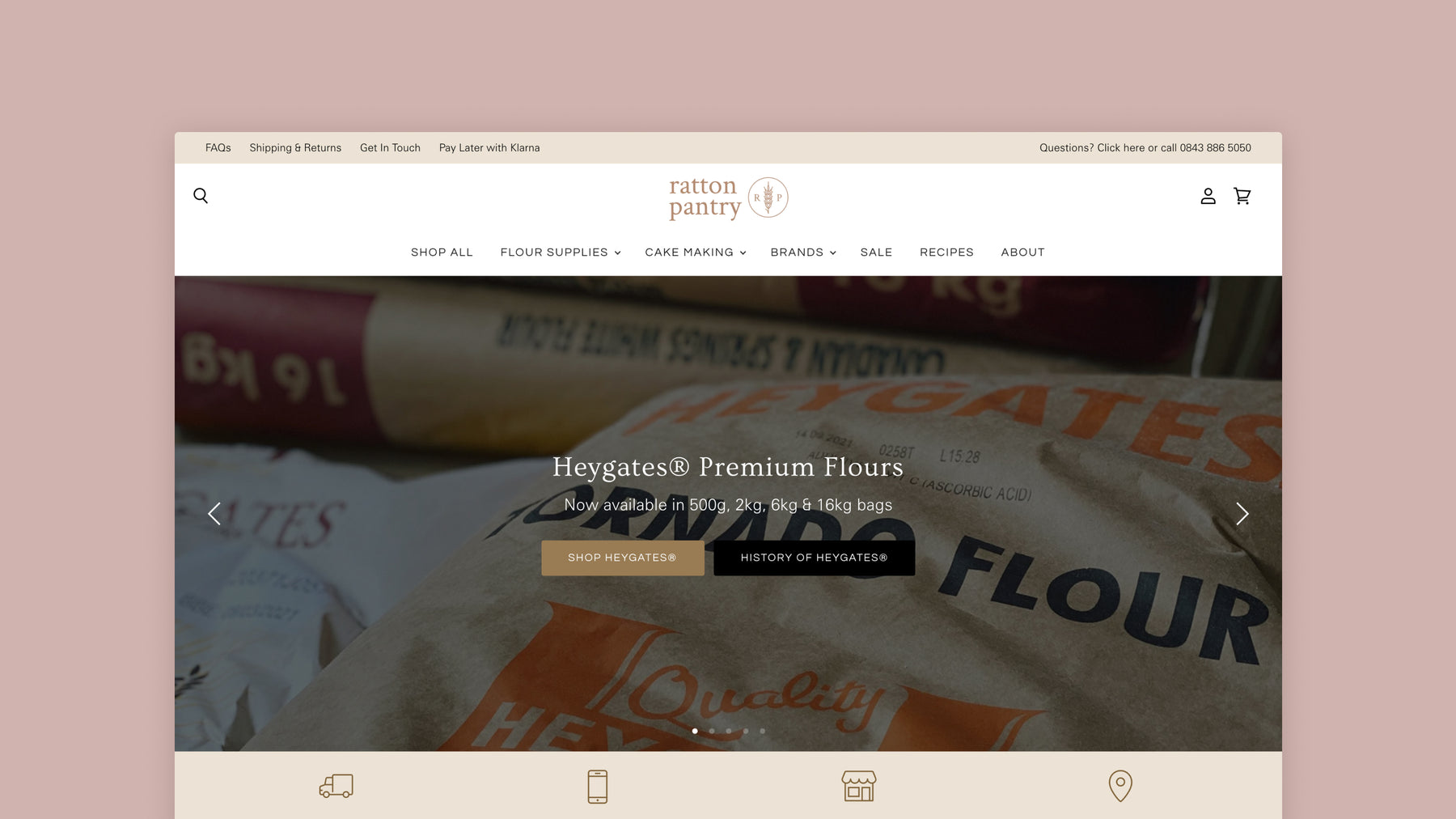
Ratton Pantry: How a pandemic food shortage led to a successful online brand
During the height of the COVID-19 pandemic, siblings-in-law Victoria Kingford and Sean Hammett had a difficult time finding high-quality baking ingredients. As avid UK home bakers, they knew others in their local area were having the same problem. So, they decided to take matters into their own hands and procured baking essentials for themselves and anyone else in their community who was interested.
They launched a small Shopify store in September 2020 called Ratton Pantry but quickly realized they were servicing a gap in the market that appealed to a much larger audience. Kingford and Hammett decided to expand their reach to the rest of the UK and even to other businesses.
“We originally looked to seek individual customers that were local to us, but after seeing a very positive response locally, we expanded our range and also our marketing efforts,” says Hammett. “We then recognised that there are plenty of small businesses that we can provide an affordable and reliable service to. Today we serve a mixture of individual home bakers and small businesses that enjoy our friendly customer service and our professional manner.”
A flexible theme for a rising brand
Just three months after launching Ratton Pantry using a free Shopify theme, Kingford and Hammett realized they needed a more robust theme to manage their brand’s growth. So, they upgrade to Pixel Union’s Superstore theme.
“We browsed the range of themes on offer and always came back to the Superstore theme,” says Hammett. “The theme caught our attention for its clean aesthetics and wide ranging functionality.The performance of the new theme has been great, with everything very quick to load, and we’ve received some great comments from our customers.”
The Ratton Pantry duo are particular fans of how many functions Superstore offers and how few custom solutions they’ve needed to implement.
“We love the product filtering on collection pages, seamless homepage features, out of stock notification on sold out products, and mega drop down navigation,” says Hammett. “We’ve custom coded a few small elements such as showing the price per kilogram for our products, however we’ve not felt the need to insert custom fixes because Pixel Union’s Superstore just offers so much out of the box!”
More sales and fewer customer service requests with Superstore
Not only has the Superstore theme helped realize Ratton Pantry’s modern branding, but Hammett also attributes the brand’s increased sales and decreased customer service enquiries to the theme.
“We’ve seen our biggest growth since upgrading our store to the Superstore theme,” says Hammett. “Customer service enquiries regarding difficulties of using the site have decreased and our sales have increased, the ultimate combination!”
Careful growth and personalized service
With only Kingford and Hammett running Ratton Pantry, bolstered by the occasional family member helping to package orders, the co-founders are prioritizing sustainable growth and stellar customer service above all else.
“It’s a real family business and we think it’s important to grow naturally, whilst keeping control and maintaining our high standards of customer service,” says Hammett. “We want to be able to control our personal service and keeping things tight at the moment allows us to do this.”
Building on what works
Ratton Pantry now offers an array of high-end pantry products, building out their product line based on customer demand and feedback.
“Today we sell a whole host of pantry and baking goods from our range of over fifty different premium flours, to cake decorations such as fondant icing and food colourings, to luxury coffee, and chocolate,” says Hammett.
Kingford and Hammett have approached their ecommerce business in a similar way, by building the brand bit-by-bit based on what’s proving to be successful. This is something that both entrepreneurs learned from previous ecommerce ventures.
“Of course, we’ve had growing pains,” says Hammett. “But our knowledge of running previous ecommerce stores has allowed us to manage an increase in orders, and the demand of maintaining a high level of customer service that comes with that.”
Seeing success through loyal customers
Ratton Pantry sees a few thousand visitors per month, a number that is increasing all the time, with about 20% being returning customers. The name of the game now for Kingford and Hammett is to continue dialing in their target audience.
“Our order conversion rate remains pretty favorable, this ties in with our approach of attracting quality visitors over sheer quantity,” says Hammett.
Don’t rush success
To those new to ecommerce, Hammett recommends growing organically and taking the time to build a solid foundation for your online brand. This includes understanding shoppers’ needs, knowing which products are resonating with shoppers, and learning how your brand fits into your customers’ lives.
It’s also important to remember that no one is ever alone in the world of ecommerce.
“Ecommerce can be tough at times, but there’s so many resources out there to help you overcome any obstacles,” says Hammett. “Any problems you run into, hundreds of other people have been there first and have been able to provide solutions.”
Want to start an online store? It’s the perfect time to do so, according to Hammett.
“It’s never been easier, quicker, and cheaper to set up an online business. Try to choose something that you’re passionate about, as this excitement and interest in the product will shine through to customers this way.”
Thinking of starting an ecommerce business? Check out The Ultimate Guide to Starting an Online Store.